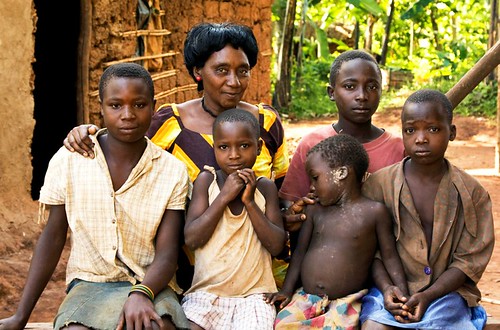Travelling in and around Kampala, you will occasionally see the tin painted signs for in-country associations and non-profits; women for democracy, HIV/AIDS outreach centers, human rights campaigns. I spoke before of the thieves that thrive here in the name of such work, taking advantage of the lack of laws and enforcement that plague this society; however, most people working at these institutions are honest, reliable and deeply concerned about the community. They do their work alongside those with bad intentions, accepting it as part of life, but undeterred nonetheless. And they are making a difference.
I am now reading the tongue-and-cheek titled White Man’s Burden by William Easterly. It points out that international foreign aid goals fail because the Planners ask the wrong question: what does the end of poverty require of foreign aid? Rather, we should ask how foreign aid can help the poor. The Planners’ approach of a master strategy with no accountability designed from top to bottom is destined to fail, as it has time and again. Throwing sweeping agendas aside, the piecemeal solution that includes accountability; creative, practical problem solving; and on the ground, real results is how the “West can help the Rest.” Easterly calls those with this type of involvement the Seekers.
Ugandans are Seekers, and I plan on being one with them. They are highly organized at the village, parish, sub-county, county, district and national level. Communities have all kinds of committees and groups representing the people’s interest and the local government deploys community development officers to assess problems and develop solutions. So with all this organization, why can’t Ugandans do it by themselves?
Quite simply, they are lacking funding. The community groups write proposals for development work, such as education and rights intervention for orphaned and vulnerable children, or maybe assistance for the elderly destitute who care for their dozen dependent grands. This is where outside aid agencies are very helpful. The community groups don’t have the money to buy markers and paper, much less hire staff, pay for travel, etc. The proposals are floated to donors, and they review it, accept it, grant the funding, then Ugandans perform the work and provide the funders with data on outcomes.
What else are Ugandans missing to make their work successful? More help. There are people working hard, but it is difficult to always find enough individuals with the skills and the time necessary. People here care for their children, grands, nieces, nephews, and cousins. They hand wash clothes. They prepare food for hours, then almost as long cleaning it. They dig holes in the deep mud for their plants, and harvest it months later. They raise and slaughter chickens and turkeys, and herd goats and cattle. They fetch water. They fetch milk. They care for the sick and the dying. They do not have modern conveniences, so they do not have much time for all else. Having basic needs met is time consuming, and community work, while highly valued and understood to be the backbone of society, is obviously of secondary importance.
They have everything in place, so I am just interjecting myself into it. I am currently assisting the Wakisi Sub-county with their SACCO (Savings and Credit Cooperative Societies) development. As the name suggests, SACCOs are community savings and lending cooperatives that provide small emergency and commercial loans to its members, and encourage member savings as well. SACCOs have existed in Uganda for some time, but the government has just rolled out a national program whereby it recognizes an official SACCO in each sub-county. The network of sub-county SACCOs forms a national association that offers greater oversight and support than previously available.
I am helping with the mobilization effort, trying to encourage more community involvement. The local board and I are holding a series of talks around the sub-county, which has over 130 villages and about 33,700 inhabitants. We are informing the community that the SACCO is now part of a national network with government backing, ensuring greater accountability and assistance.

My role is essentially that of celebrity spokesperson. Africans hear that a mzungu will be at the meeting and come in part out of curiosity. They also listen to me. There is a general understanding that I come from a place where things are better, including education. I am not sure exactly how persuasive my whiteness is, but apparently it does carry some weight. This actually makes me feel pretty lousy; authority by way of skin color. I suppose I could disprove their assumptions through purposeful incompetence and untrustworthiness, but I think I’ll take the more well-worn path to bridge cultural gaps in understanding: getting to know one another better.
BTW - I am okay! Really! Quit worrying about me! :)







Oh Mzungu muzungu, how i have heard that word, lol! How ever I told everyone I was Mexican and suddenly they'd start bashing americans again. but once I was asked to give the president a message. As if, right?
ReplyDeleteLove it, keep up the great work. Didnt you take malaria pills with you?
-h